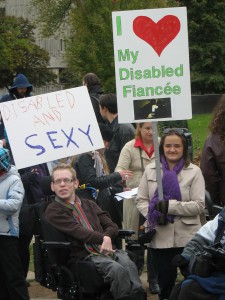By Karen Nickel
Special to The Dialog
In 2011 the Disability Pride movement sprang out of the momentum of the Occupy movement, focused on how austerity, cuts and the lack of police training protocols adversely affecting their community. A main point was that persons with disabilities were the “lowest 1% of the 99%” and persons with disabilities need to be included as active movement leaders and participants.
This year’s Disability Pride rally and march on Oct. 13 continued demanding these issues be addressed. Don Weitz spoke up for psychiatric survivors calling for “an end to disabling policies that dis-empower and violate the rights of our brothers and sisters”. “Ableism,” he went on to say, “was the hidden belief that persons with disabilities were ‘inferior’,” and “mentalism was the belief that disabled persons were incapable of making their own decisions.” Weitz said, “mentalism and ableism work hand-in-hand to institutionalize and take away rights in a way that was not acceptable and not tolerable; but by working together we will strike a blow and win!”
Melissa Graham, co-organizer and emcee for the rally, began the event with a condemnation of all oppression against persons with disabilities through ableism and acknowledged that for some this can be experienced concurrently with classism, racism, sexism, homophobia and transphobia. She rallied the roughly 40 enthusiastic attendees to be loud, visible and proud during the march.
There were a couple of things that were unique to Disability Pride march that showed the reality of the challenges faced and made plain the reasons why there is a huge need for change. There was the blown tire of a mobility chair requiring a van pick up; someone to watch for potholes; during the march people realized some chants were inappropriate if they referred to “standing up” and were quickly changed to “sit down” or “speak up”; there was the need to explain to bicycle cops why saying “keep walking” and “keep moving, people” was offensive while hurrying us forward but making us stop at lights. Something I haven’t experienced in other marches.
One person who wanted to attend the march was unable to because when they arrived at their local subway station the elevator was out of order. There was no way they could make it to the rally. Plans were undone because of one broken elevator. It’s impossible to guess how many people would like to attend the march, but for various reasons like this, were unable to.
Related story: Lack of accessibility a big problem at GBC


